The armed wing of Palestinian group Hamas has said its militants had shot and killed an Israeli hostage and wounded two others, both women, "in two separate incidents" in Gaza.
"In two separate incidents, two (Hamas) soldiers assigned to guard enemy prisoners fired at a Zionist prisoner, killing him immediately, and also injured two female prisoners critically," Abu Obeida, spokesman for the Ezzedine Al-Qassam Brigades, said in a statement posted on Telegram, without identifying the hostages.
It comes as international pressure continued to mount for a ceasefire in Gaza, with the UK, France and Germany making a joint plea for an end to fighting between Israel and Hamas with "no further delay".
The call came a day after Palestinian militant group Hamas - whose 7 October attack on Israel triggered the war - urged mediators to implement a truce plan presented by US President Joe Biden instead of holding more talks.
"The fighting must end now, and all hostages still detained by Hamas must be released," French President Emmanuel Macron, German Chancellor Olaf Scholz and British Prime Minister Keir Starmer said in a joint statement.
"The people of Gaza need urgent and unfettered delivery and distribution of aid," it said.
"There can be no further delay."
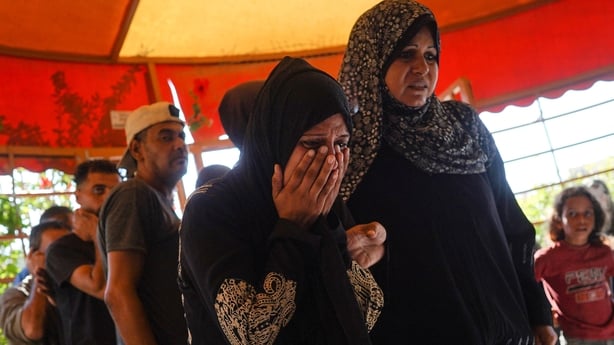
Earlier, Palestinian medicics said at least 18 people have been killed and several wounded in Israeli military strikes on Khan Younis, Palestinian medics have said.
It comes as Israeli forces pressed on with operations near the southern Gaza city amid an international push for a deal to halt fighting in Gaza and prevent a slide into a wider regional conflict with Iran and its proxies.
More families and displaced persons streamed out of areas threatened by new evacuation orders telling people to clear the area.
Later, an Israeli airstrike killed five people in the Zeitoun suburb of Gaza City, and two others were killed in Rafah, near the border with Egypt, medics said.
As fighting continued, Hamas reacted skeptically to the latest round of Egyptian and Qatari-brokered talks due on Thursday, saying it had seen no sign of movement from the Israeli side.
The group said yesterday that mediators must force Israel to accept a ceasefire proposal based on ideas from US President Joe Biden, which Hamas had accepted, "instead of pursuing further rounds of negotiations or new proposals that would provide cover for the occupation's aggression".
Two sources close to Hamas said the group was convinced the new call for talks was coordinated beforehand with Israel to deter responses from Iran and Hezbollah to the assassination of the group's chief, Ismail Haniyeh, in Tehran and a top Hezbollah leader in Lebanon.
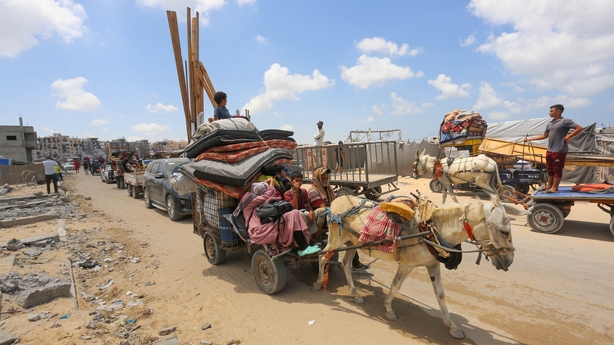
"It is a mild rejection you can say. Should Hamas receive a workable plan, an Israeli positive response to the proposal it had accepted, things may change, but so far Hamas believes Netanyahu isn't serious about reaching a deal," said one Palestinian official close to the mediation effort.
Hamas' reaction to the talks came as preparations for a larger scale confrontation grew, with Washington ordering a guided missile submarine to the Middle East and the Abraham Lincoln strike group accelerating its deployment to the region.
Israeli Defence Minister Yoav Gallant told US Defense Secretary Lloyd Austin that Iran was making preparations for a large-scale military attack on Israel, Barack Ravid, a normally well-sourced reporter for Axios News, reported on X.
Israel has been braced for a major attack since last month when a missile killed 12 youngsters in the Israeli-occupied Golan Heights and Israel responded by killing a senior Hezbollah commander in Beirut.
A day after that operation, Ismail Haniyeh, the political leader of Hamas, was assassinated in Tehran, drawing Iranian vows of retaliation against Israel.
On Saturday, scores of people were killed in Israeli strikes on a school building in Gaza City that the military said targeted fighters from the armed wings of Hamas and Islamic Jihad.
Mahmoud Bassal, spokesman for the civil defence agency, said yesterday that identifying the victims could take at least two days as "we have many bodies torn into pieces" and "shredded or burnt by the bombs".
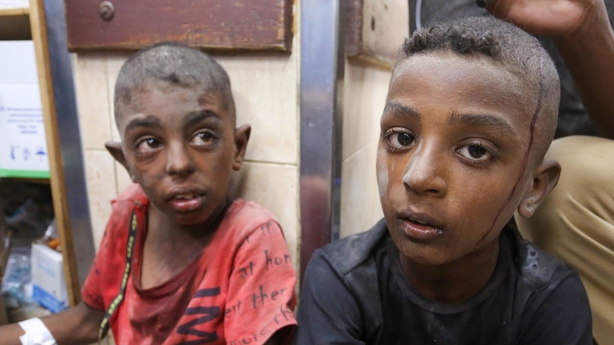
The Israeli military released an updated document with names and other details of 31 fighters it said were killed in Saturday's strike.
Hamas and the Islamic Jihad denied any of their fighters were present at the school.
European airlines extend Middle East flight suspensions
Some European airlines have extended flight suspensions to parts of the Middle East up to and including 21 August amid fears of an escalation in conflict in the region.
German carrier Lufthansa announced that it would be extending its suspension of flights to Tel Aviv, Tehran, Beirut, Amman and Erbil until, and including, 21 August.
The airline also stated that it will not be using Iranian and Iraqi airspace during that period, it said in an emailed statement.
Meanwhile, Swiss International Air Lines also said it had extended the suspension of its flights to and from Tel Aviv and Beirut up to and including 21 August.
It added that the airspace over Iran, Iraq and Israel would be avoided until the same date. The airline also reissued a previous statement about extending flight suspensions until 13 August.
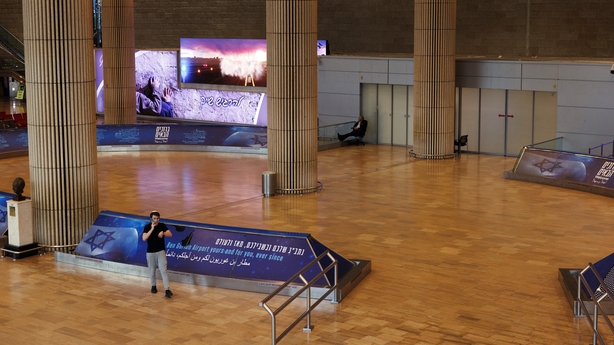
Three-phase plan
Hamas said yesterday it wanted the implementation of a truce plan laid out by Joe Biden on 31 May and later endorsed by the UN Security Council, "rather than going through more negotiation rounds or new proposals".
Hamas "demands that the mediators present a plan to implement what they proposed to the movement... based on Biden's vision and the UN Security Council resolution, and compel the (Israeli) occupation to comply", it said.
Unveiling the plan, Mr Biden had called it a three-phase "roadmap to an enduring ceasefire and the release of all hostages", and said it was an Israeli proposal. Mediation efforts since then have failed to produce an agreement.
Last week Hamas named its Gaza chief Yahya Sinwar to succeed slain political leader and truce negotiator Ismail Haniyeh, killed on 31 July in Tehran in an attack blamed on Israel, which has not claimed responsibility.
Mr Haniyeh's killing, just hours after Israel assassinated the military chief of Lebanese Hamas ally Hezbollah in a strike on Beirut, spurred intense diplomacy to avert a wider war in the Middle East.
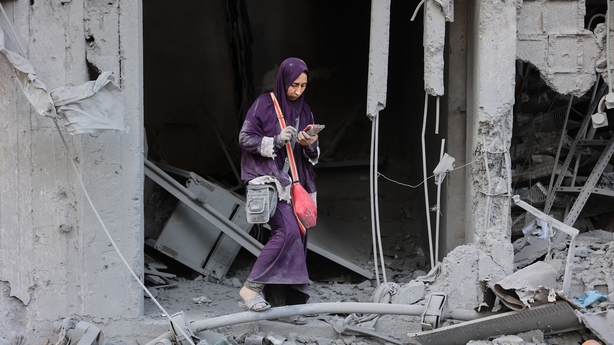
In Khan Younis, southern Gaza's main city, already ravaged by months of bombardment and battles, AFP journalists said hundreds of Palestinians had fled northern neighbourhoods after Israel issued fresh evacuation orders.
The military dropped leaflets and sent mobile phone messages warning of "dangerous combat" in Al-Jalaa district and telling Palestinian residents to leave the area, which until yesterday had been designated a humanitarian safe zone.
Similar evacuation orders have preceded major military incursions, often forcing Palestinians displaced numerous times by the war to pack up and leave again.
The Israeli military said in a statement its forces were "about to operate against the terrorist organisations in the area".

